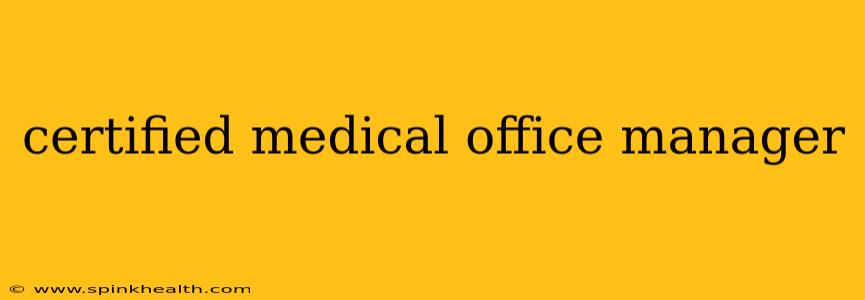The crisp white coat, the hushed tones of the waiting room, the intricate dance of scheduling and billing – the medical office is a complex ecosystem, and at its heart beats the Certified Medical Office Manager (CMOM). This isn't just a title; it's a testament to years of experience, dedication, and a deep understanding of the healthcare industry. My journey to becoming a CMOM wasn't a straight line, but it was a rewarding one, filled with challenges that ultimately shaped my career. Let's explore what it takes to become a CMOM and what this certification truly means.
What Does a Certified Medical Office Manager Do?
This is a question I often get asked, and the answer is multifaceted. A CMOM is much more than an administrator; they are the linchpin of a smooth-running medical practice. They are responsible for everything from overseeing staff and managing budgets to ensuring compliance with regulations and optimizing patient flow. Think of them as the conductor of a complex orchestra, ensuring every instrument plays its part in harmony. My day-to-day responsibilities ranged from hiring and training staff, to analyzing financial reports, to implementing new software to streamline processes. It's a role that requires a blend of soft skills – leadership, communication, and problem-solving – and hard skills – medical billing and coding, HIPAA compliance, and practice management software.
What are the Requirements to Become a Certified Medical Office Manager?
The path to becoming a CMOM isn't uniform. Different certifying bodies have their own specific requirements, but generally, they look for a combination of education and experience. Many programs require an associate's or bachelor's degree in healthcare administration or a related field. However, substantial experience in medical office management can sometimes substitute for formal education. The key is demonstrating a proven track record of success in managing the operational and administrative aspects of a medical practice. In my case, I started as a medical assistant and worked my way up, gaining valuable experience in every aspect of the office before pursuing certification.
What Education is Needed to Become a Medical Office Manager?
This is a common question, and the answer depends on the specific certification you pursue. Some organizations accept extensive work experience in lieu of a formal degree. However, a degree or diploma in healthcare administration, medical assisting, or a related field is often advantageous. Many colleges and universities offer specific programs designed to prepare students for medical office management roles, providing the necessary knowledge and skills. This formal education can provide a strong foundation and make the certification process smoother.
What Certifications are Available for Medical Office Managers?
Several organizations offer medical office manager certifications. Research is crucial to find the best fit for your career goals and experience level. Each certification has unique requirements and focuses on different aspects of medical office management. Consider the reputation of the certifying body, the recognition of the certification within your geographical area, and the specific skills emphasized by the program. Don't hesitate to compare several options before making a decision.
How Long Does it Take to Become a Certified Medical Office Manager?
The timeframe varies greatly, depending on your existing education and experience. If you already possess a relevant degree and significant experience, the process might be relatively quick. However, if you need to pursue additional education, the timeline will be longer. Factor in time for study, exam preparation, and the application process itself. Planning and dedication are crucial for success.
What are the Benefits of Becoming a Certified Medical Office Manager?
The rewards of becoming a CMOM extend far beyond the title itself. Certification demonstrates your expertise and commitment to the profession, boosting your credibility and earning potential. It can open doors to new opportunities, leadership roles, and a higher level of responsibility within the healthcare industry. Furthermore, the structured learning process involved in obtaining certification can significantly enhance your skills and knowledge, allowing you to better serve your patients and your employer. For me, the sense of accomplishment and professional recognition was immensely satisfying.
Conclusion: A Rewarding Path
The journey to becoming a Certified Medical Office Manager is challenging, but the rewards are substantial. It demands dedication, continuous learning, and a genuine passion for healthcare. But ultimately, it's a path that leads to a career filled with purpose, professional growth, and the satisfaction of knowing you're making a real difference in the lives of patients and colleagues alike. The title of CMOM isn't merely a designation – it's a symbol of expertise, commitment, and leadership in a critical sector of the healthcare industry.

